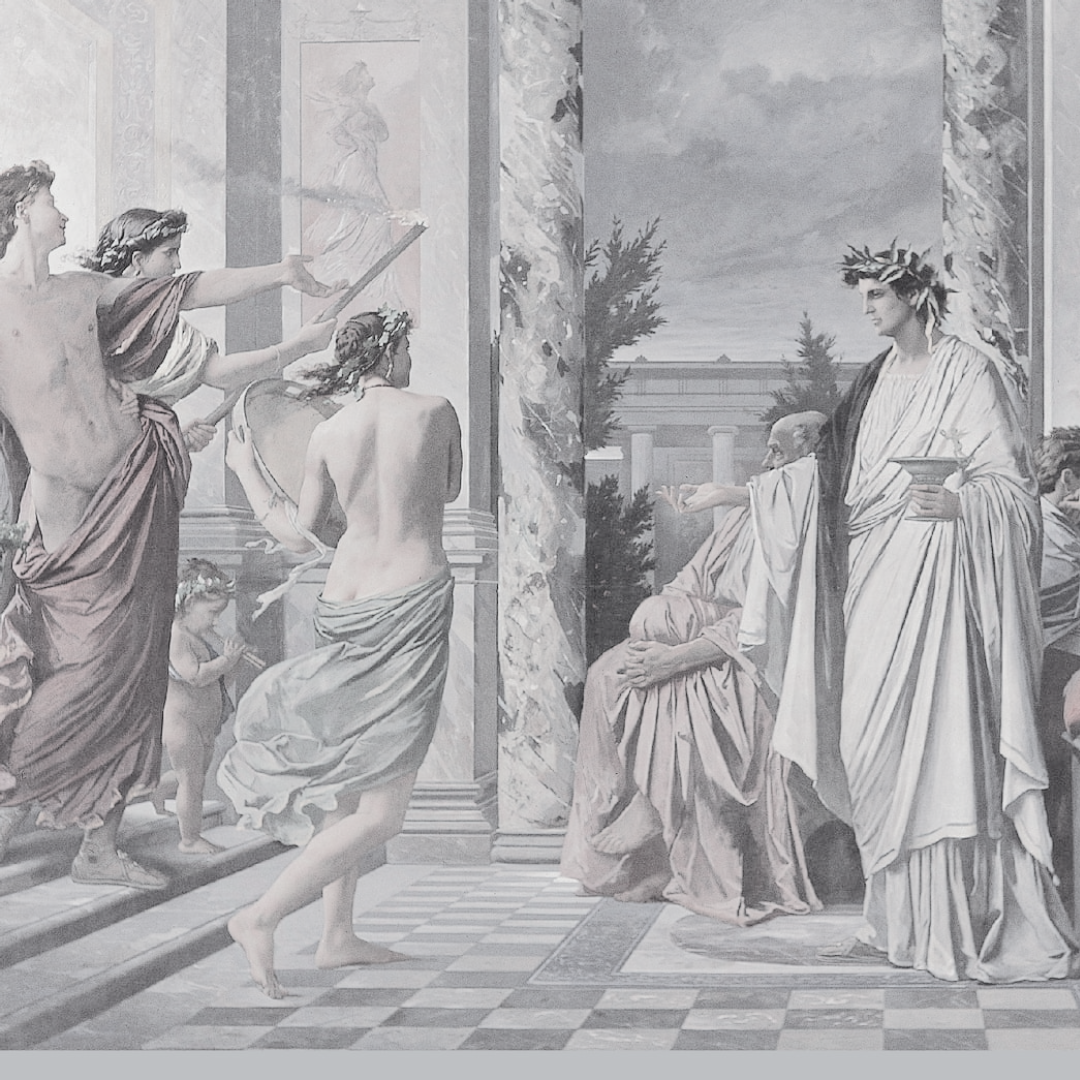Synopsis
Symposium by Plato is a dialogue on Socrates and his peers as they attend a banquet. The men of the banquet begin to take part in a light-hearted contest based on who could come up with the best speech in praise of Love. There are seven speakers, each substantiating the different origins of Love and it’s nature. Even though all the speeches differ, in one way or another, I believe they all reveal some truth into the nature of Love.
The first to speak is Phaedrus, an Athernian aristocrat, who states Love a mighty god and one of the eldest. He notes the most honourable love is the best incentive to virtue (178d).
Second is Pausanias, a lawyer, who distinguishes between two different types of Love: Common and Heavenly Love, love of the body and the other of the soul.
Eryximachus, a doctor, agrees with Pausanias in that there are two types of love, however he delineates one as “healthy” and the other “diseased”. For Eryximachus, these two different definitions of love reconcile and meet together in harmony.
The next one to speak is Aristophanes, a comic playwright, who states that humanity’s ancestors were once two beings in one body; who tried to overthrow the gods but failed and were to be separated from each other as punishment. For Aristophanes, human nature was originally whole as one, and the desire and pursuit of the whole is love (193a).
After Aristophanes spoke Agathon, a tragic poet, the host of the banquet and the celebrated, who poetically lists the romantic characteristics of Love.
Then, there was Socrates, who recounts his time with Diotima, a wise prophet and philosopher, who teaches Socrates the nature of Love and His different pursuits for beauty. Diotima’s famous Ladder of Love reveals the stages in which beauty is recognized.
Last to speak is Alcibiades, an Athenian statesman, who was not at the banquet initially, but drunkenly barges in before his speech. Instead of reciting a speech in praise of Love, it was rather, a speech in praise of Socrates. And although he clearly made his speech directed towards Socrates, in a miserable way, it can be considered a speech regarding the despairs of unrequited Love.
As these arguments vary, their praises find common ground in the good and beauty of Love. Except for Alcibiades, who’s speech comes as a warning.
Phaedrus
Phaedrus' speech was short and reiterates often that Love is a mighty god, one of the eldest, the most honourable, and the source of the greatest good (178a-c; 180b). The devotion to Love is to virtue. He states that Love causes men and women alike to do great things, especially for their beloved. Love makes people brave and motivates them to be righteous, and if the lover were to ever die for their beloved, such a sacrifice would be recognized and paid for indefinitely by the gods (179d).
According to Phaedrus, there is honour in a death devoted to Love.
Pausanias
Pausanias, on the other hand, distinguishes two types of Love: Common and Heavenly Love. Common Love, he states, describes bodily love and of pleasure, that of which desires only to gain an end (183e). According to him, love of the body than of the soul is an unstable and short-lived affair, an evil and vuglar love. Heavenly Love, on the other hand, is noble, lifelong, and follows the laws of virtue and wisdom.
Eryximachus
Eryximachus agrees with Pausanias in that there are two types of love, however he refers to one as “healthy” and the other “diseased”. Together, although they differ, these two definitions of love reconcile and meet together in harmony. Eryximachus does not proclaim the healthy one “good” and the other “bad”, but states them both as preconditions to Love. The “healthy” love governs the “diseased” so that they balance each other in harmony. Love is the mean, the agreement between the two forms of contrasts.
Aristophanes
Aristophanes tells the tale of prehistoric man to explain the origin and nature of Love. According to him, there was once three sexes: man, woman, and a third sex called “Adogynous”. These beings were of two in one body, and they were strong and kind in nature. However, in an attempt to overthrow Olympus, they failed and the gods thought of a punishment just for their actions. The gods could not kill them, because then their sacrifices and worships would end. So Zeus decided they would separate them into two, teaching them to be humble. As a result, they were forced to roam the earth in despair, looking for their other halves; the desire to find the other deeply rooted within our nature. For Aristophanes, Love consists of the instinct to reunite to our original nature, our “other halves”, the innate desire and pursuit of the whole.
Agathon
Agathon lists the poetic and romantic characteristics of Love. He, too, states Love as a powerful god, but unlike Phaedrus, Agathon states Love as the youngest of the gods. Love is the most fair, and just of the gods. He states Love as temperate, courageous, wise, a poet and a maker of poets, an artist and a peacemaker. Unfortunately, he does not go into much detail of these characteristics, although his language encapsulates the idealization of Love.
Socrates
In his speech, Socrates does not pursue the usual pattern his arguments follow, wherein which he conducts the debate with his companions in order to reveal some truth; instead he recounts his time with the wise Diotima, who takes his place as inquisitor, but for the most part, directly demonstrates the nature of Love. She states love neither man nor god, but a powerful deity; a bridge between man and god, conceived by Penia, or Poverty, who slept with Poros, the god of Plenty, after He fell into a drunken slumber on the night the gods were celebrating Aphrodite’s natal day. His father is wealthy and wise, and his mother poor and foolish and as a result, Love inherits traits from both His parents. And since He was born on the same day as Aphrodite, He became her follower and servant. Like his mother, Love is always in distress: He is always poor, and anything but tender or fair; he is rough and unclean, and lives nowhere (203d). Like His father, He is bold, strong, resourceful, and enthusiastic in the pursuit of wisdom. Love is a philosopher at all times, and as such, He is not necessarily wise, but a lover of wisdom; He is in a mean between ignorance and knowledge. He is also never in want and never in wealth (203d-e). This, according to Diotima, is the nature of Love.
Once Love’s origin was established, Diotima reveals to Socrates that love is not necessarily beautiful, but is of the beautiful, and possession of the beautiful is also the possession of the good, which is happiness (204e). And since this possession is something desired throughout one’s life, and not just for a moment, Love then may be described as the everlasting possession of the good (206a). Again, Love is always that of beautiful things, and beauty is not the end but the means to something greater, and that being the achievement of procreation. According to Diotima, the everlasting possession of the good through procreation is an immortal principle for the mortal being (206d). Beauty a guide towards Love, that of which advances up the ladder. Diotima states the first step up the ladder is to love one form only, to recognize the beauty of the physical features of an individual only (210a). Once the first step is matched, soon the individual will notice that the beauty of one is similar to the beauty of another, becoming a lover of all beautiful forms. In the third stage the lover will come to understand that beauty of the mind is more honourable than the beauty of the physical (210b). From the mind, the lover is compelled to notice the beauty of institutions and laws, and soon after, to love the sciences, or knowledge. However, these steps are towards something greater and that is the recognition of beauty in its own form; loving the beauty of Love as it is. This ladder illustrates the way in which one comes to fully understand Love and absolute beauty.
Alcibiades
Last to join the symposium is Alcibiades, who’s drunken speech was in praise of Socrates rather than of love. It was an attest to the anguish, almost patheticness, of an unreciprocated Love. Upon entering the banquet, Alcibiades was quick to comment on Socrates, asserting his silvertongue and ability to charm and persuade other men. He admits Socrates astonishes and devastates him, and is always overwhelmed by Socrates and his words. Alcibiades ultimately states his admiration for Socrates despite his mistreatment towards himself and his other lovers. Nevertheless, it is clear Alcibiades loves Socrates regardless.
Meaning
Each of these arguments find truth in the meaning of Love in that it is a nature of being far beyond our comprehension (something other-worldy and great), nevertheless, Love is still something universally recognized as constituting some form of beauty. The praises in Symposium all complement each other and there is truth in all of them. Diotima’s Ladder of Love establishes the steps into which absolute Love is recognized: which begins with the recognition of love in one simple form, to recognizing this beauty in all fair forms, and from fair forms to fair practises, to fair notions, to the recognition of absolute beauty itself. Diotima says the nature of Love lies between the traits of his mother and father, deities of opposing forces. The concept of Love and its extremities is also found in Pausanias and Eryximachus’ speech: on one hand Love is the greatest of all goods, to which virtue can be brought into being - exemplified by Phaedrus and Aristophanes. And on the other hand, Love can lead to temptations of the body and corruption - exemplified by Alcibiades. And through Aristophanes, the innate feeling of totality with our partners is portrayed in a fantastic story that was composed so literally that the imagery may seem absurd at first, but is still able to pertain some validity in regards to the feeling of completeness with ones we love. When Symposium’s speeches in praise of Love are interpreted and realized through their extravagant narratives, the essences of a timeless and universal understanding of Love are revealed.
Recommended Reading:
Plato, Jowett, B., Reed, C. A., & Johnson, C. (2010). Dialogues of Plato. New York, NY: Simon & Schuster Paperbacks.





